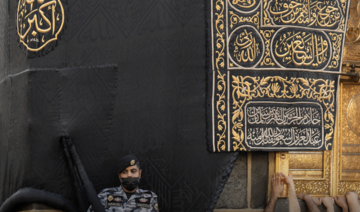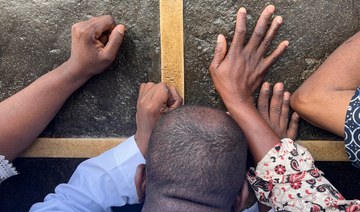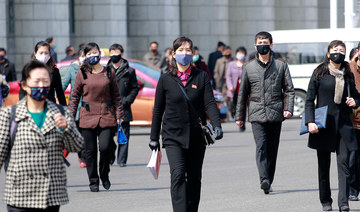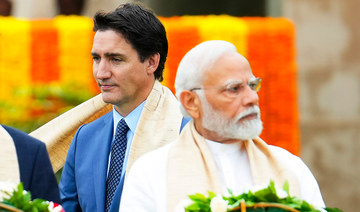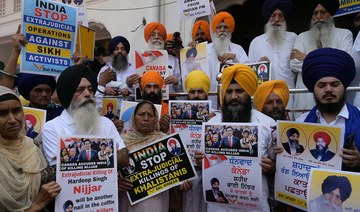Since the start of his political career, Donald Trump has played on stereotypes about Jews and politics.
He told the Republican Jewish Coalition in 2015 that “you want to control your politicians” and suggested the audience used money to exert control. In the White House, he said Jews who vote for Democrats are “very disloyal to Israel.”
Two years ago, the former president hosted two dinner guests at his Florida residence who were known to make virulent antisemitic comments.
And this week, Trump charged that Jewish Democrats were being disloyal to their faith and to Israel. That had many American Jews taking up positions behind now-familiar political lines. Trump opponents accused him of promoting antisemitic tropes while his defenders suggested he was making a fair political point in his own way.
Jonathan Sarna, American Jewish history professor at Brandeis University, said Trump is capitalizing on tensions within the Jewish community.
“For people who hate Donald Trump in the Jewish community, certainly this statement will reinforce their sense that they don’t want to have anything to do with him,” he said. “For people who like Donald Trump in the Jewish community, they probably nod in agreement.”
To many Jewish leaders in a demographic that has overwhelmingly identified as Democratic and supported President Joe Biden in 2020, Trump’s latest comments promoted harmful antisemitic stereotypes, painting Jews as having divided loyalties and that there’s only one right way to be Jewish religiously.
“That escalation of rhetoric is so dangerous, so divisive and so wrong,” said Rabbi Rick Jacobs, president of the Union for Reform Judaism, the largest US Jewish religious denomination. “This is a moment when Israel needs there to be more bipartisan support.”
But Matt Brooks, CEO of the Republican Jewish Coalition, said the former president’s comments must be heard in context of the Israel-Hamas war and Democratic criticisms of the state of Israel.
“What the president was saying in his own unique style was giving voice to things I get asked about multiple times a day,” Brooks said. “How can Jews remain Democrats in light of what is going on?” He contended the Democratic Party is “no longer the pro-Israel bastion it used to be.”
More than 31,800 Palestinians have been killed in the Israeli offensive that followed Hamas’ Oct. 7 attack on southern Israel, in which militants killed some 1,200 people and took hostages. Much of northern Gaza has been leveled, and officials warned famine is imminent.
Trump’s comments followed a speech by Senate Majority Leader Chuck Schumer, the country’s highest-ranking Jewish official. Schumer, a Democrat, last week sharply criticized Prime Minister Benjamin Netanyahu ‘s handling of the war in Gaza. Schumer called for new elections in Israel and warned the civilian toll was damaging Israel’s global standing.
“Any Jewish person that votes for Democrats hates their religion,” Trump retorted Monday on a talk show. “They hate everything about Israel.”
A cascade of Jewish voices, from Schumer to the Anti-Defamation League to religious leaders, denounced Trump’s statement.
In a statement to The Associated Press on Wednesday, the Trump campaign doubled down, criticizing Schumer, congressional Democrats’ support of Palestinians and the Biden administration’s policies on Iran and on aid to Gaza.
“President Trump is right,” said Karoline Leavitt, national press secretary for the Trump campaign.
Jeffrey Herf, an antisemitism expert at the University of Maryland, disagrees with Schumer’s call for a ceasefire in Gaza, but believes most Democrats support Israel — and he said a second Biden term would be better for it than a second Trump one.
“If (Trump) loses the 2024 election, his comments prepare the way for blaming the Jews for his defeat,” Herf said. “The clear result would be to fan the flames of antisemitism and assert that, yet again, the Jews are guilty.”
Sarna saw Trump as trying to appeal to politically conservative Jews, particularly the small but fast-growing Orthodox segment, who see Trump as a defender of Israel.
Also, about 10 percent of US Jews are immigrants, according to a 2020 Pew Research Center report. Sarna said significant numbers are conservative.
At the same time, Democrats face the tension between their Jewish constituency, which is predominantly pro-Israel, and its progressive wing, which is more pro-Palestinian.
Sarna said that while it may seem odd to focus so much attention on subsections of a minority population, “elections in America are very close, and every vote counts.”
Conservative commentator Ben Shapiro said Tuesday on his podcast that Trump “was making a point that, frankly, I have made myself, which is that Jews who are voting Democrat do not understand the Democratic Party.” Shapiro, who practices Orthodox Judaism, contended the party “overlooks antisemitism” within its ranks.
Rabbi Jill Jacobs, the CEO of T’ruah, a rabbinic human rights organization, said Trump has no business dictating who’s a good Jew.
“By insinuating that good Jews will vote for the party that is best for Israel, Trump is evoking the age-old antisemitic trope of dual loyalty — an accusation that Jews are more loyal to their religion than to their country, and therefore can’t be trusted,” she said. “Historically, this accusation has fueled some of the worst antisemitic violence.”
In his own time in office, Trump’s policy “of supporting Prime Minister Netanyahu and the settler agenda only endangered Palestinians and Israelis and made peace more difficult to achieve,” Jacobs said.
Pittsburgh-based journalist Beth Kissileff — whose husband, a rabbi in the Conservative denomination of Judaism, in 2018 survived the nation’s deadliest antisemitic attack — said it was highly offensive for Trump to be a “self-appointed arbiter” of what it means to be Jewish.
“Chuck Schumer had every right to say what he said,” Kissileff added. “Just because we’re Jews, it doesn’t mean we agree with everything the (Israeli) government is doing. We have compassion for innocent Palestinian lives.”
Brooks, of the Republican Jewish Coalition, defended the former president against antisemitism charges, pointing to his presidential record as an example of proof.
Trump pursued policies that were popular among American Christian Zionists and Israeli religious-nationalists, including moving the US embassy to Jerusalem and supporting Jewish settlements in occupied territories. His daughter Ivanka is a convert to Orthodox Judaism, and her husband and their children are Jewish. The couple worked as high-profile surrogates to the Jewish community during Trump’s administration.
Trump’s core supporters include white evangelicals, many of whom believe the modern state of Israel fulfills biblical prophecy. Prominent evangelicals who support Zionism have also been criticized for inflammatory statements about Jewish people.
Sixty-nine percent of Jewish voters in 2020 supported Biden, while 30 percent supported Trump, according to AP VoteCast, a survey of the electorate conducted in partnership with NORC at the University of Chicago. That made Jewish voters one of the religious groups where support for Biden was strongest. Also, 73 percent of Jewish voters in 2020 said that Trump was too tolerant of extremist groups.
Rabbi Bradley Shavit Artson said Trump’s comments are “in a complex middle zone” — not explicitly antisemitic, but reliant on such tropes.
American Jews base their votes on a complex mix of issues and values, “among them inclusion, diversity, climate change, civil rights,” said Artson, a leader within Conservative Judaism. “While they love Israel diversely, many of us also care about the wellbeing and self-determination of Palestinians.”
US Jews upset with Trump’s latest rhetoric say he doesn’t get to tell them how to be Jewish
https://arab.news/b3gg7
US Jews upset with Trump’s latest rhetoric say he doesn’t get to tell them how to be Jewish
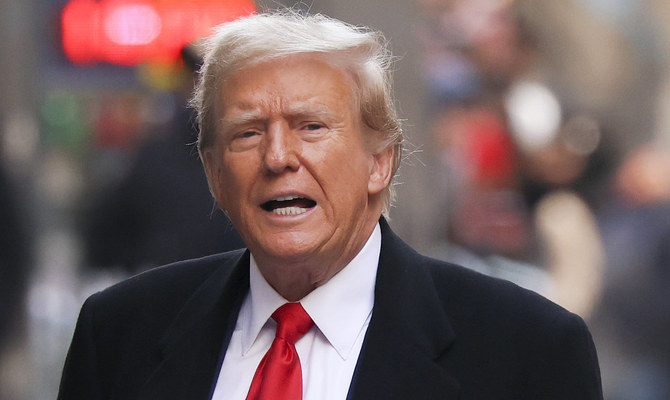
- Trump’s core supporters include white evangelicals, many of whom believe the modern state of Israel fulfills biblical prophecy
First Bangladeshi pilgrims ready to depart for Hajj
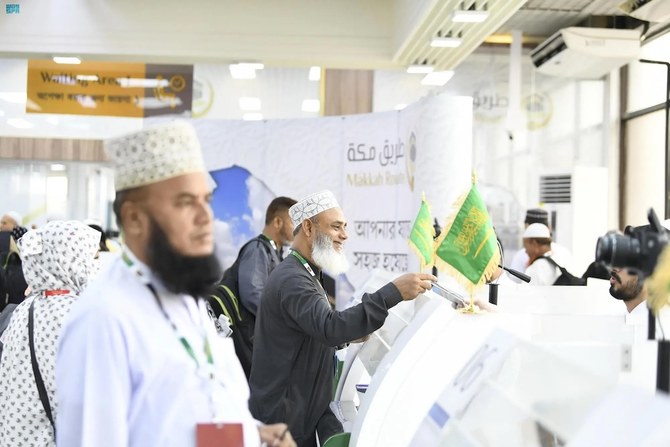
- The country’s quota this year is 127,000 pilgrims
- First flight leaves for Saudi Arabia on Thursday
DHAKA: Thousands of Bangladeshis are going to become some of the earliest Hajj pilgrims to arrive in Saudi Arabia this year, with the first batch scheduled to fly to Jeddah on Thursday.
This year, the Hajj is expected to start on June 14 and end on June 19.
While the pilgrimage itself can be performed over five or six days, pilgrims often arrive early, knowing that it may be a once-in-a-lifetime opportunity to fulfill their religious duty.
The first Hajj flight carrying 419 pilgrims is scheduled to leave for Jeddah from Hazrat Shahjalal International Airport in Dhaka on Thursday morning.
“Our pilgrims will be the first batch of Hajj pilgrims from around the world who will arrive in the Kingdom,” Mohammad Matiul Islam, additional secretary at the Ministry of Religious Affairs, told Arab News.
“Some pilgrims opt to travel earlier to the holy land, as it gives them spiritual peace. It’s the pilgrims’ choice to determine their time of travel.”
This year, Saudi Arabia granted Bangladesh a quota of 127,000 pilgrims to perform the spiritual journey that is one of the five pillars of Islam. Because of the rising cost of airfares to the Middle East, fewer Bangladeshis than expected will be able to go.
Bangladesh, one of the most populous Muslim-majority countries, also struggled to meet the quota in 2023, when the minimum government rate for Hajj was $6,000.
To prevent the same scenario during the 2024 pilgrimage season, the Bangladeshi government reduced the cost by $1,000, but high inflation at home prevented a third of prospective pilgrims from registering.
“As we fell short of meeting the number, a quota of 41,000 is surrendered to Saudi Arabia,” Islam said. “The surrendering of this (remaining slots) will not affect the receiving of our Hajj quota next year.”
Saudi visa registration for Bangladeshis will end on Saturday, and most of them will be departing over the next few weeks from Dhaka, where they will be assisted by Saudi authorities under the flagship Makkah Route initiative.
The pre-travel program was launched by the Kingdom in 2019 to help pilgrims to meet all the visa, customs and health requirements at their airport of origin, and save them long hours of waiting before and upon arrival in Saudi Arabia.
From Wednesday, those flying in the next few days can wait for departure at a special Hajj camp near the airport in Dhaka.
“While staying at the Hajj camp, the pilgrims have their Bangladeshi immigration part done. Also, a part of Saudi immigration is being done here as the pilgrims leave their luggage here to Makkah Route authorities,” Islam said.
“The air-conditioned accommodation here is free of cost for the pilgrims ... We suggest the pilgrims from outside Dhaka be at the Hajj camp two days before their flight. The camp can hold more than 5,000 pilgrims at a time.”
Russia warns French troops legitimate targets if they are sent to Ukraine
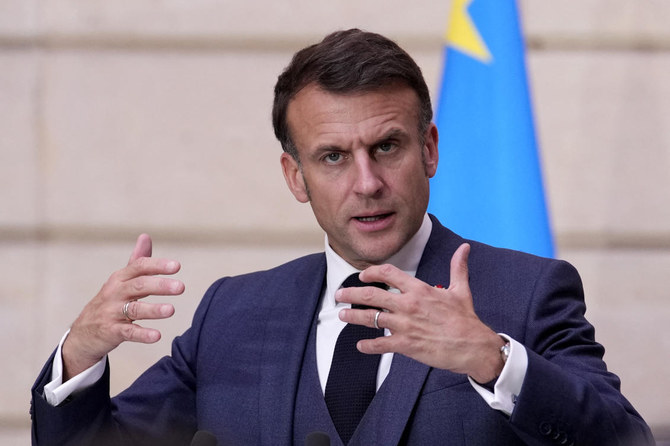
- French president Emmanuel Macron caused controversy in February by saying he could not rule out the deployment of ground troops in Ukraine in the future
MOSCOW: Russia warned France on Wednesday that if President Emmanuel Macron sent troops to Ukraine then they would be seen as legitimate targets by the Russian military.
Macron caused controversy in February by saying he could not rule out the deployment of ground troops in Ukraine in the future. The French leader warned that if Russia wins in Ukraine then Europe’s credibility will be reduced to zero.
“It is characteristic that Macron himself explains this rhetoric with the desire to create some kind of ‘strategic uncertainty’ for Russia,” Russian Foreign Ministry Spokeswoman Maria Zakharova told reporters.
“We have to disappoint him — for us the situation looks more than certain,” Zakharova said.
“If the French appear in the conflict zone, they will inevitably become targets for the Russian armed forces. It seems to me that Paris already has proof of this.”
Zakharova said Russia was already seeing growing numbers of French nationals among those killed in Ukraine.
Russia said on Monday it would practice the deployment of tactical nuclear weapons as part of a military exercise after what the Moscow said were threats from France, Britain and the United States.
AstraZeneca says withdraws Covid vaccine ‘for commercial reasons’

LONDON: British drugmaker AstraZeneca said Wednesday that it has withdrawn its Covid vaccine Vaxzevria, one of the first produced in the pandemic, citing “commercial reasons” and a surplus of updated jabs.
“As multiple, variant Covid-19 vaccines have since been developed there is a surplus of available updated vaccines. This has led to a decline in demand for Vaxzevria, which is no longer being manufactured or supplied,” an AstraZeneca spokeperson said.
3 Indian men charged with killing Sikh separatist leader in Canada appear in court
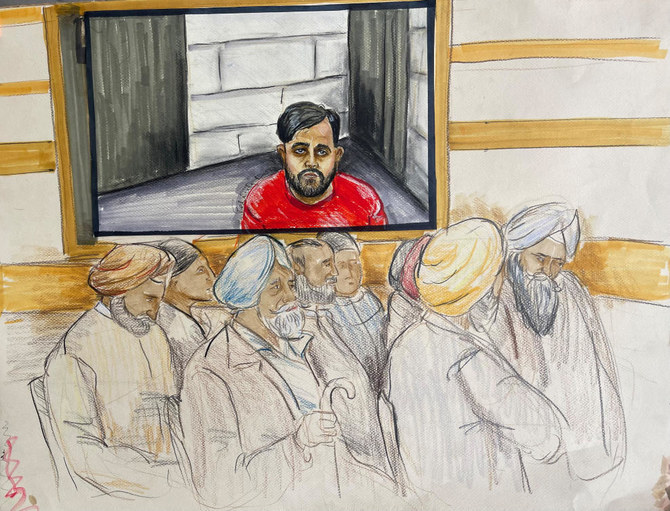
SURREY, British Columbia: Three Indian men charged with killing Sikh separatist leader Hardeep Singh Nijjar in British Columbia last year have appeared in court in the case that set off a diplomatic spat after Canadian Prime Minister Justin Trudeau said there were “credible allegations” of Indian involvement.
Canadian police had arrested the three Indian men last week in Edmonton, Alberta, and they have been charged with first-degree murder and conspiracy to commit murder.
Canadian Mounted Police Superintendent Mandeep Mooker said Friday that the investigation into whether the men had ties to India’s government was ongoing.
Nijjar, 45, was shot to death in his pickup truck last June after he left the Sikh temple he led in the city of Surrey. An Indian-born citizen of Canada, he owned a plumbing business and was a leader in what remains of a once-strong movement to create an independent Sikh homeland. India designated him a terrorist in 2020 and at the time of his death had been seeking his arrest for alleged involvement in an attack on a Hindu priest.
India has denied involvement in the slaying. In response to the allegations, India told Canada last year to remove 41 of its 62 diplomats in the country. Tensions remain but have somewhat eased since.
The arrested men — Kamalpreet Singh, 22, Karan Brar, 22, and Karanpreet Singh, 28 — appeared in court Tuesday via a video link and agreed to a trial in English. They were ordered to appear in British Columbia Provincial Court again on May 21.
Brar and Karanpreet Singh appeared in the morning. Kamalpreet’s appearance was delayed until the afternoon as he waited to speak to a lawyer.
The small provincial courtroom was filled with spectators during the morning session. Others crowded into an overflow room to watch the proceedings via video.
Richard Fowler, the defense lawyer representing Brar, said the case will eventually be moved to the Supreme Court and combined into one case.
About 100 people gathered outside the courthouse waving yellow flags and holding photos of Indian government officials whom they accuse of being involved in Nijjar’s killing.
Canadian police say the three suspects had been living in Canada as non-permanent residents.
A bloody decadelong Sikh insurgency shook north India in the 1970s and 1980s until it was crushed in a government crackdown in which thousands of people were killed, including prominent Sikh leaders.
The Khalistan homeland movement has lost much of its political power but still has supporters in the Indian state of Punjab, as well as in the sizable overseas Sikh diaspora. While the active insurgency ended years ago, the Indian government has repeatedly warned that Sikh separatists were trying to make a comeback.
UN: Myanmar displaced now at 3 million
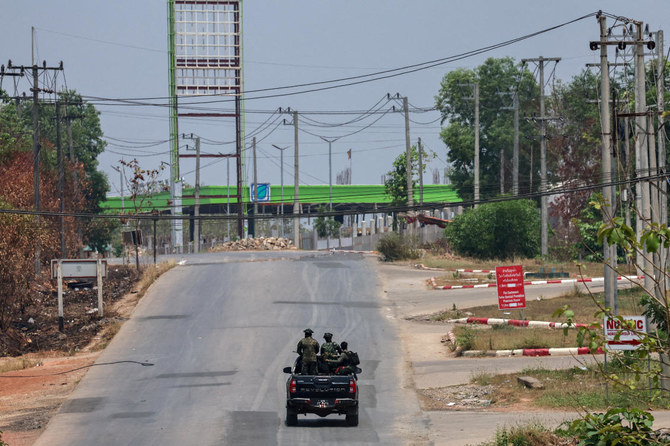
- An estimated one-third of those displaced are children, according to the UN statement
YANGON: The number of displaced people in Myanmar has reached three million, the United Nations said, the vast majority forced to flee their homes by conflict unleashed by the military’s 2021 coup.
Around 2.7 million have fled since the putsch that toppled Aung San Suu Kyi’s government after a short-lived experiment with democracy.
The coup sparked renewed clashes with established ethnic armed groups and birthed dozens of new “People’s Defense Forces” that the military has failed to crush.
“Myanmar stands at the precipice in 2024 with a deepening humanitarian crisis,” the UN’s resident coordinator in the country said in a statement released on Monday.
An estimated one-third of those displaced are children, according to the statement.
Around half of the three million have been displaced since late last year, when an alliance of ethnic armed groups launched an offensive across northern Shan state, the statement said.
The offensive seized swathes of territory and lucrative trade crossings on the China border, posing the biggest threat to the junta since it seized power.
Myanmar’s borderlands are home to a plethora of ethnic armed groups, many of whom have battled the military since independence from Britain in 1948 over autonomy and control of lucrative resources.
The UN said a severe funding shortfall was hampering its relief efforts, particularly ahead of the May-June cyclone season.
Last year cyclone Mocha smashed into western Myanmar’s Rakhine state, killing at least 148 people.
More than 355,000 people are currently displaced in western Rakhine state, which has been rocked since November by clashes between the Arakan Army and the military, the UN said.





